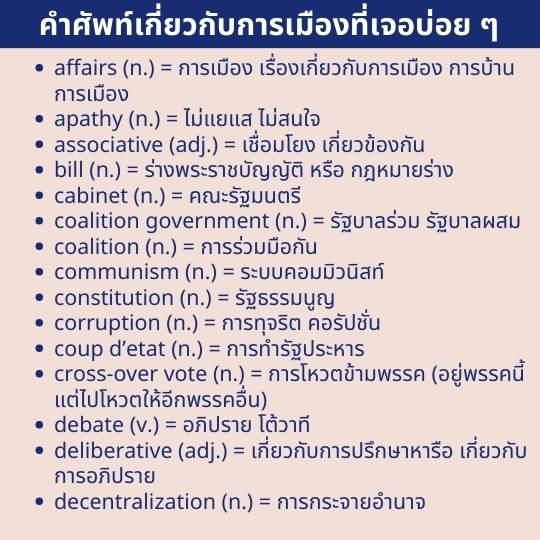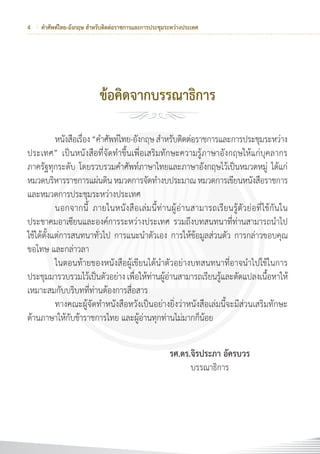ภาครัฐ ภาษาอังกฤษ: การเรียนรู้และความสำคัญ
ภาครัฐ ภาษาอังกฤษ: การเรียนรู้และความสำคัญ
เรื่องที่ต้องเน้นในการเตรียมสอบภาษาอังกฤษ (สนาม ก.พ. ท้องถิ่น และราชการ)
Keywords searched by users: ภาครัฐ ภาษาอังกฤษ ภาครัฐและเอกชน ภาษาอังกฤษ, หน่วยงานภาครัฐ ภาษาอังกฤษ, ภาคเอกชน ภาษาอังกฤษ, ภาคประชาชน ภาษาอังกฤษ, ภาครัฐ คือ, Government sector, เอกชน รัฐบาล ภาษาอังกฤษ
ขอบคุณที่ให้ความสนใจในการเขียนบทความเกี่ยวกับ “ภาครัฐ ภาษาอังกฤษ” ฉันจะเริ่มต้นโดยอธิบายเกี่ยวกับเนื้อหาที่ต้องการรวบรวมในบทความของคุณ:
การเรียนรู้เรื่องภาครัฐ
การเรียนรู้เกี่ยวกับภาครัฐในภาษาอังกฤษเป็นการรู้จักและเข้าใจเกี่ยวกับโครงสร้างของระบบรัฐบาล รวมถึงหน้าที่และบทบาทของภาครัฐต่าง ๆ และผลกระทบต่อสังคมและการเมืองในประเทศต่าง ๆ
การใช้คำศัพท์ภาครัฐในภาษาอังกฤษ
การเรียนรู้คำศัพท์ที่เกี่ยวข้องกับภาครัฐในภาษาอังกฤษ เช่น เครื่องบริหารราชการ, รัฐบาล, การปกครอง, นโยบาย, กฎหมาย, ฯลฯ เป็นสิ่งสำคัญที่ช่วยในการเข้าใจและการสื่อสารในสถานการณ์ที่เกี่ยวข้องกับภาครัฐ
ความหมายและคำนิยามที่เกี่ยวข้องกับภาครัฐ
การอธิบายและบทนำความหมายของภาครัฐ รวมถึงคำนิยามต่าง ๆ เกี่ยวกับองค์กรทางราชการ โครงสร้างการปกครอง และความสัมพันธ์ระหว่างภาครัฐและประชาชน
การนำภาครัฐไปใช้ในสังคมและการเมือง
การสำรวจวิเคราะห์ถึงความสำคัญของภาครัฐในการกำหนดนโยบาย การมีส่วนร่วมในการตัดสินใจ และการมีอิทธิพลต่อการพัฒนาในสังคมและการเมือง
การศึกษาข้อมูลและแหล่งอ้างอิงที่เกี่ยวข้องกับภาครัฐและภาษาอังกฤษ
การวิจัยและศึกษาเพิ่มเติมจากแหล่งข้อมูลที่เกี่ยวข้อง เช่น พจนานุกรมออนไลน์ และเว็บไซต์ที่เป็นที่เชื่อถือเกี่ยวกับเนื้อหาภาครัฐและภาษาอังกฤษ
การพัฒนาทักษะการเขียนและการพูดในเรื่องภาครัฐภาษาอังกฤษ
วิธีการปรับปรุงทักษะการเขียนและการพูดในเรื่องของภาครัฐภาษาอังกฤษ รวมถึงการเรียนรู้การใช้ภาษาทางการเมืองและระบบการปกครอง
ภาครัฐและเอกชน ภาษาอังกฤษ
ความสัมพันธ์และความสำคัญของการร่วมมือระหว่างภาครัฐและเอกชนในทางภาษาอังกฤษ โดยเน้นการสื่อสารและการทำงานร่วมกันเพื่อประโยชน์ของสังคมและเศรษฐกิจ
หน่วยงานภาครัฐ ภาษาอังกฤษ
การอธิบายเกี่ยวกับหน่วยงานภาครัฐและบทบาทของแต่ละหน่วยงานในระบบการปกครอง พร้อมกับคำศัพท์และคำอธิบายที่เกี่ยวข้องในภาษาอังกฤษ
ภาคเอกชน ภาษาอังกฤษ
ความหมายและคำนิยามของภาคเอกชน รวมถึงบทบาทของภาคเอกชนในการพัฒนาเศรษฐกิจและสังคม และคำศัพท์ที่เกี่ยวข้องในภาษาอังกฤษ
ภาคประชาชน ภาษาอังกฤษ
การอธิบายเกี่ยวกับภาคประชาชนและบทบาทของสังคมในการสนับสนุนและเข้าร่วมกับภาครัฐ รวมถึงคำศัพท์และคำอธิบายที่เกี่ยวข้องในภาษาอังกฤษ
ภาครัฐ คือ, Government sector, เอกชน รัฐบาล ภาษาอังกฤษ
อธิบายความหมายและคำแปลของภาครัฐและเอกชนในภาษาอังกฤษ เพื่อให้เกิดความเข้าใจและเชื่อมโยงกับความหมายในภาษาไทย
คำถามที่พบบ่อย (FAQs)
-
ภาครัฐและเอกชน ภาษาอังกฤษคืออะไร?
- ภาครัฐแท้จริงคือ…
- เอกชนหมายถึง…
-
ภาครัฐและภาคเอกชนแตกต่างกันอย่างไรในภาษาอังกฤษ?
- ภาครัฐและภาคเอกชนมีความแตกต่างกัน…
- ในภาษาอังกฤษมีคำและคำวลีที่แตกต่างกันในการกล่าวถึงทั้งสองนี้…
-
ภาคประชาชนมีบทบาทในการปกครองอย่างไรในระบบภาครัฐ?
- ภาคประชาชนมีบทบาทใน…
- การมีส่วนร่วมของประชาชนเป็นสิ่งสำคัญใน…
-
เครื่องบริหารราชการและรัฐบาลคืออะไร?
- เครื่องบริหารราชการคือ…
- รัฐบาลคือ…
-
การศึกษาภาครัฐในภาษาอังกฤษมีประโยชน์อย่างไร?
- การศึกษาภาครัฐในภาษาอังกฤษช่วยให้…
- สามารถเข้าใจและมีส่วนร่วมในกิจกรรมของภาครัฐได้มากยิ่งขึ้น
นอกจากนี้ คุณสามารถศึกษาเพิ่มเติมจากแหล่งข้อมูลที่แนบมาและเว็บไซต์ที่เกี่ยวข้องเพื่อเสริมความรู้และข้อมูลที่ใช้ในการเขียนบทความของคุณได้
กรุณาอธิบายความต้องการเพิ่มเติมหรือข้อมูลเฉพาะที่ต้องการให้เพิ่มในบทความเพื่อให้ได้ความเข้าใจที่ถูกต้องและครอบคลุมเนื้อหาตามที่คุณต้องการได้อีกครั้ง เมื่อได้รับข้อมูลเพิ่มเติมแล้ว ฉันยินดีที่จะช่วยเติมเต็มเนื้อหาของบทความให้ครอบคลุมและเป็นประโยชน์ต่อคุณได้ ขอบคุณครับ/ค่ะ!
Categories: นับ 47 ภาครัฐ ภาษาอังกฤษ

[phāk rat] (n, exp) EN: public sector ; government sector. ภาครัฐบาล [phāk ratthabān] (n, exp) EN: public sector ; government sector.
ภาครัฐและเอกชน ภาษาอังกฤษ
ขณะที่เราพูดถึงเรื่อง “ภาครัฐและเอกชน” นั้น เป็นเรื่องที่เกี่ยวข้องกับความสัมพันธ์ระหว่างภาครัฐกับภาคเอกชนในการดำเนินงานและกิจกรรมต่าง ๆ ซึ่งมีความสำคัญในด้านต่าง ๆ ของสังคมและเศรษฐกิจ โดยที่ทั้งสองภาคมีบทบาทและความสำคัญที่แตกต่างกันออกไป
ภาครัฐและเอกชน: ความหมายและบทบาท
“ภาครัฐ” หมายถึง รัฐบาลหรือหน่วยงานของรัฐที่มีอํานาจในการบริหารจัดการในด้านต่าง ๆ ของสังคม รวมถึงการให้บริการสาธารณะ เช่น การศึกษา การแพทย์ การคุ้มครองสิทธิมนุษยชน และการพัฒนาเศรษฐกิจของประเทศ เป็นต้น ภาครัฐมักจะมีอํานาจที่มาจากกฎหมายและการเลือกตั้ง และมีบทบาทสําคัญในการสร้างนโยบายที่ส่งเสริมความเจริญเติบโตของประเทศและประชาชน
“เอกชน” หมายถึง ภาคเอกชนหรือภาคเอกชนตามที่เรียกกันในประเทศไทย คือ ส่วนที่เป็นเอกภาคของสังคมที่เกิดจากการดําเนินกิจกรรมทางธุรกิจ อุตสาหกรรม หรือกิจการทางการค้าโดยเน้นไปที่การทำกําไร การลงทุน และการพัฒนาทรัพยากรต่าง ๆ เพื่อให้เกิดประโยชน์แก่ตนเองและกลุ่มผู้มีส่วนได้เสียในกิจการนั้น ๆ
ความสัมพันธ์ระหว่างภาครัฐและเอกชน
ภาครัฐและเอกชนมีความสัมพันธ์และความเชื่อมโยงกันอย่างแตกต่างกันไป บางครั้งอาจมีความขัดแย้ง แต่ในบางกรณีก็มีการทำงานร่วมกันเพื่อให้ประสบความสําเร็จ ซึ่งทั้งสองภาคมีบทบาทและส่วนที่สําคัญต่อการพัฒนาประเทศและสังคม ภาครัฐมักจะเป็นผู้กําหนดนโยบายและกฎระเบียบที่สําคัญ ในขณะที่ภาคเอกชนมีบทบาทในการสร้างความเจริญเติบโตทางเศรษฐกิจ การสร้างงานที่มีประสิทธิภาพ และการส่งเสริมนวัตกรรมในการพัฒนา
ภาครัฐและเอกชนในประเทศไทย
ในประเทศไทย ภาครัฐและเอกชนมีบทบาทที่สําคัญในการพัฒนาเศรษฐกิจและสังคม โดยภาครัฐมีบทบาทในการกําหนดนโยบายและกฎระเบียบต่าง ๆ ในขณะที่เอกชนมีบทบาทในการสนับสนุนและร่วมกันในการพัฒนาประเทศ ซึ่งมีการสร้างความร่วมมือระหว่างทั้งสองภาคอย่างสม่ำเสมอ เพื่อให้เกิดการเจริญเติบโตและความยั่งยืนที่ดีต่อประเทศและประชาชน
FAQ (คำถามที่พบบ่อย)
1. ภาครัฐและเอกชนมีความสําคัญอย่างไรต่อการพัฒนาประเทศ?
ความสัมพันธ์ระหว่างภาครัฐและเอกชนมีบทบาทสําคัญในการสร้างความเจริญเติบโตทางเศรษฐกิจ การสร้างงาน และการพัฒนาทรัพยากรต่าง ๆ โดยมีการทำงานร่วมกันเพื่อให้ประเทศมีความเป็น競ทางเศรษฐกิจที่แข็งแรงและยั่งยืน
2. ภาคเอกชนมีบทบาทในการส่งเสริมนวัตกรรมหรือไม่?
ใช่ ภาคเอกชนมีบทบาทสําคัญในการส่งเสริมนวัตกรรม โดยการลงทุนในการวิจัยและพัฒนา การสนับสนุนกิจกรรมนวัตกรรม และการสร้างสภาพแวดล้อมที่เอื้อต่อการสร้างความใหม่ในการพัฒนา
3. ภาครัฐมีบทบาทในการคุ้มครองสิทธิและผู้มีส่วนได้เสียอย่างไร?
ภาครัฐมีหน้าที่คุ้มครองสิทธิและผู้มีส่วนได้เสียต่าง ๆ โดยการสร้างนโยบายที่เพื่อให้ทุกคนมีโอกาสและสิทธิเท่าเทียม การคุ้มครองสิทธิมนุษยชน และการสร้างสิ่งอํานวยความสะดวกในการเข้าถึงบริการสาธารณะ
การที่ภาครัฐและเอกชนมีความสัมพันธ์และการทำงานร่วมกันอย่างมีประสิทธิภาพจึงเป็นประโยชน์อย่างมากต่อการพัฒนาทั้งด้านเศรษฐกิจและสังคมของประเทศ ซึ่งการที่เข้าใจและร่วมมือกันอย่างเหนือกว่าความแตกต่าง เป็นประโยชน์อย่างมากที่จะเสริมสร้างพัฒนาการในทุกด้านของชุมชนและประเทศชาติของเราด้วยกัน.
หน่วยงานภาครัฐ ภาษาอังกฤษ
หน่วยงานภาครัฐ ภาษาอังกฤษ: A Comprehensive Guide
Introduction
In the realm of public administration, หน่วยงานภาครัฐ (government agencies) play a pivotal role in shaping the policies, implementing regulations, and providing essential services to the citizens. Understanding the intricacies of these state entities is crucial for anyone seeking comprehensive insights into the functioning of the Thai government. This article aims to serve as a guide, offering detailed information and explaining specific concepts related to หน่วยงานภาครัฐ in the Thai language.
Government Agencies in Thailand
หน่วยงานภาครัฐ, translated as government agencies, are diverse entities responsible for various aspects of public administration. These agencies operate at different levels, including central, provincial, and local levels, each serving specific functions to ensure the effective governance of the country.
Central Government Agencies
At the national level, several key government agencies play crucial roles in policymaking, law enforcement, and public service provision. Some of the prominent central government agencies include:
-
กระทรวง (Ministry): Ministries are responsible for specific policy domains such as education, health, finance, and foreign affairs.
-
สำนักงาน (Office/Bureau): Offices or bureaus are administrative units that support ministries in executing their functions.
-
กรม (Department): Departments operate under ministries and focus on specialized areas within a policy domain.
Provincial and Local Government Agencies
Provincial and local government agencies operate at the regional and community levels, playing a crucial role in implementing national policies and addressing local needs. These agencies include:
-
ท้องถิ่น (Local Administration): Local administration entities, such as municipalities and sub-district administrative organizations, work on local development and service provision.
-
หน่วยงานภาคท้องถิ่น (Local Government Agencies): These agencies operate at the provincial and district levels, facilitating coordination between central and local administrations.
Understanding the Structure of หน่วยงานภาครัฐ
The structure of government agencies in Thailand is hierarchical, with clear lines of authority and responsibility. The highest authority is typically the minister or head of the ministry, followed by directors general, directors, and other administrative levels. This hierarchical structure ensures a systematic approach to policymaking and implementation.
Roles and Functions
-
Policymaking: Government agencies are instrumental in formulating policies that guide the nation’s development. Ministries and departments collaborate to draft policies aligned with the government’s vision.
-
Service Provision: Agencies provide essential services to the public, ranging from healthcare and education to infrastructure development and social welfare programs.
-
Regulation and Enforcement: Government agencies create and enforce regulations to maintain order and ensure compliance with laws. This includes regulatory bodies overseeing industries such as finance, telecommunications, and environmental protection.
-
Economic Development: Some agencies focus on promoting economic growth and sustainability by implementing programs that stimulate investment, trade, and innovation.
FAQ Section
-
What is the role of a ministry in the Thai government?
Ministries in the Thai government are responsible for formulating and implementing policies within specific domains, such as education, health, and finance. They play a central role in shaping the nation’s development agenda. -
How do local government agencies contribute to community development?
Local government agencies are vital for community development as they focus on addressing local needs, managing resources, and implementing national policies at the grassroots level. They play a key role in infrastructure development, public services, and community engagement. -
What is the difference between a bureau and a department in the Thai government?
A bureau is an administrative unit that supports ministries in their functions, providing assistance in areas such as research and coordination. On the other hand, a department operates under a ministry and focuses on specialized areas within a policy domain, implementing policies and programs. -
How are government agencies structured in Thailand?
Government agencies in Thailand follow a hierarchical structure with clear lines of authority. The minister or head of the ministry is the highest authority, followed by directors general, directors, and other administrative levels. This structure ensures efficient policymaking and implementation.
Conclusion
หน่วยงานภาครัฐ in Thailand are multifaceted entities that contribute significantly to the nation’s governance, development, and well-being of its citizens. This comprehensive guide has provided insights into the roles, functions, and structure of government agencies at various levels. Understanding these aspects is crucial for anyone interested in the intricacies of Thai public administration.
ภาคเอกชน ภาษาอังกฤษ
ภาคเอกชน ภาษาอังกฤษ: A Comprehensive Guide
In the realm of language learning, the combination of private sector initiatives and the English language is a subject of great importance. This guide aims to delve into the intricacies of “ภาคเอกชน ภาษาอังกฤษ” (Private Sector English) to provide readers with a comprehensive understanding of this evolving landscape.
Understanding ภาคเอกชน ภาษาอังกฤษ
The Context
In Thailand, the private sector plays a pivotal role in language education, particularly in English language learning. This sector encompasses a wide array of institutions, ranging from language schools and tutoring centers to online platforms and corporate training programs.
Importance of English Proficiency
English proficiency is crucial in today’s globalized world. It opens doors to international opportunities, facilitates cross-cultural communication, and enhances one’s competitiveness in the job market. Recognizing the significance of English, individuals and businesses turn to the private sector to hone their language skills.
Diverse Learning Platforms
The private sector offers diverse learning platforms to cater to the varying needs of learners. Traditional language schools provide structured courses with certified instructors, while online platforms offer flexibility and self-paced learning. Corporate training programs, on the other hand, address the specific language requirements of businesses.
Key Concepts in ภาคเอกชน ภาษาอังกฤษ
Tailored Curriculum
One notable feature of private sector language programs is the ability to tailor the curriculum. Unlike standardized public education, private institutions can customize courses to meet the specific needs and proficiency levels of their students.
Technology Integration
With the rise of technology, many private language programs incorporate innovative tools and platforms to enhance the learning experience. This includes interactive apps, virtual classrooms, and AI-driven language assessments.
Business English
A significant subset of private sector English education is Business English. This specialized training focuses on language skills relevant to professional environments, such as workplace communication, business writing, and presentation skills.
Global Certification
Private language institutions often align their programs with globally recognized language proficiency certifications such as TOEFL, IELTS, and Cambridge English Certificates. This not only adds credibility to the courses but also provides learners with tangible proof of their language skills.
Advantages of Choosing ภาคเอกชน ภาษาอังกฤษ
Flexibility
Private sector language programs offer flexibility in terms of scheduling and course selection. Learners can choose from a variety of courses and determine the pace of their learning, making it suitable for individuals with diverse commitments.
Industry-Relevant Skills
For professionals seeking to enhance their career prospects, private sector Business English courses provide industry-specific language skills. This targeted approach ensures that learners acquire language proficiency directly applicable to their workplace.
Personalized Attention
Smaller class sizes and personalized attention from instructors are common features of private language education. This allows for a more tailored learning experience, with instructors addressing individual strengths and weaknesses.
Frequently Asked Questions (FAQ)
Q1: What is the typical duration of a private sector English language course?
A1: The duration varies based on the type of course and the learner’s objectives. Short-term courses may last a few weeks, while comprehensive programs can span several months.
Q2: Are private sector language programs more expensive than public alternatives?
A2: Private sector programs often come with a higher price tag, attributed to factors such as personalized instruction, flexible schedules, and additional resources. However, the investment is considered worthwhile for those prioritizing quality and tailored learning.
Q3: How can I assess the credibility of a private language institution?
A3: Look for accreditation, reviews from past students, and affiliations with recognized language proficiency testing bodies. Additionally, inquire about the qualifications and experience of the instructors.
Q4: Is online learning as effective as traditional classroom-based instruction?
A4: The effectiveness of online learning depends on individual learning preferences. Many find online platforms convenient and effective, especially when they offer interactive features and real-time feedback.
In conclusion, ภาคเอกชน ภาษาอังกฤษ is a dynamic field that empowers individuals and businesses to navigate the globalized landscape through enhanced English proficiency. Whether one opts for traditional classroom learning or embraces the flexibility of online platforms, the private sector stands as a key player in shaping linguistic competence in the Thai context.
อัปเดต 47 ภาครัฐ ภาษาอังกฤษ



See more here: cacanh24.com
Learn more about the topic ภาครัฐ ภาษาอังกฤษ.
- ภาครัฐ แปลว่าอะไร ดูความหมาย ตัวอย่างประโยค หมายความว่า …
- *ภาครัฐ* แปลว่าอะไร ดูความหมาย ตัวอย่างประโยค หมายความว่า …
- ภาครัฐบาล – พจนานุกรมแปล ไทย-อังกฤษ LEXiTRON
- ภาครัฐ แปลว่าอะไร ความหมาย คำแปล หมายความว่า ตัวอย่างประโยค
- หน่วยงานของรัฐ ส่วนราชการ รัฐวิสาหกิจ องค์การมหาชน …
- ภาครัฐบาล ภาษาอังกฤษ – พจนานุกรมไทย-อังกฤษ
See more: https://cacanh24.com/category/local blog





